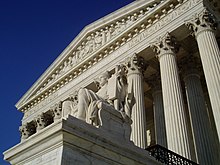Our website is made possible by displaying online advertisements to our visitors.
Please consider supporting us by disabling your ad blocker.
Authority

Authority is commonly understood as the legitimate power of a person or group over other people.[1][dead link][2] In a civil state, authority may be practiced by legislative, executive, and judicial branches of government,[3][need quotation to verify] each of which has authority and is an authority.[4] The term "authority" has many nuances and distinctions within various academic fields ranging from sociology to political science.
In the exercise of governance, the terms authority and power are inaccurate synonyms. The term authority identifies the political legitimacy, which grants and justifies rulers' right to exercise the power of government; and the term power identifies the ability to accomplish an authorized goal, either by compliance or by obedience; hence, authority is the power to make decisions and the legitimacy to make such legal decisions and order their execution.[5][need quotation to verify]
- ^ Bealey, Frank (1999). The Blackwell Dictionary of Political Science: A User's Guide to Its Terms. Wiley. pp. 22–23. ISBN 0-631-20694-9.
- ^
Miller, David (26 June 2003). "Political authority". Political Philosophy: A Very Short Introduction. Very Short Introductions. Oxford: Oxford University Press. p. 20. ISBN 9780191577864. Retrieved 28 September 2024.
Political authority has two sides to it. On the one side, people generally recognize it as authority, in other words as having the right to command [...] On the other side, people who refuse to obey are compelled to do so by the threat of sanctions [...]. And these two aspects are complementary.
- ^ The New Fontana Dictionary of Modern Thought Third Edition, Allan Bullock and Stephen Trombley, Eds. p. 115.
- ^
Covell, Charles (9 July 2009). "Rousseau, Kant and Hegel". The Law of Nations in Political Thought: A Critical Survey from Vitoria to Hegel. Basingstoke: Palgrave Macmillan. ISBN 9780230244450. Retrieved 28 September 2024.
[According to Kant, the] juridicial order of civil society found its concrete institutional embodiment in the civil state, as through the legislative, executive and judicial authorities that comprised the basis of the state constitution and the system of state government. Of the three state authorities, the legislative authority was understood by Kant to be foundational in that it stood as the sovereign authority in the state [...].
- ^ The New Fontana Dictionary of Modern Thought, Third edition, Allan Bullock and Stephen Trombley, eds., pp. 677–678.
Previous Page Next Page


